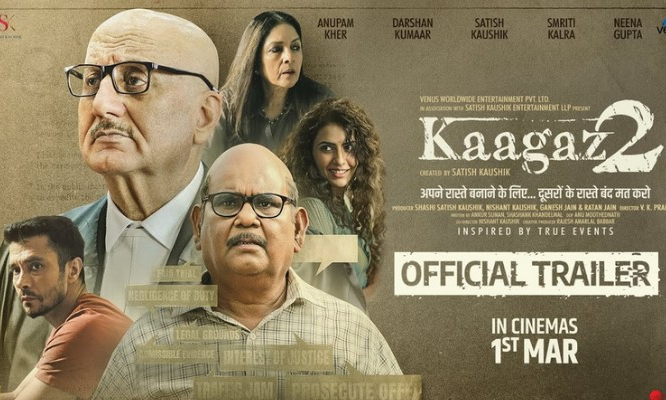A Movie That Leaves You With Food for Thought

Film: Kaagaz 2
Cast: Anupam Kher, Darshan Kumaar, Satish Kaushik, Anirudhh Dave, Neena Gupta
The street is arguably the best stage of democracy. It was so till the antithesis slowly but very steadily found acceptance in the system. Even as the credibility of a functional democracy withstood the watering down of this crucial assumed democratic right, the subscribers to “anti-strikes” increased, our hallowed institutions started on the epochal journey of balancing the right to protest with the right to life. As early as in 1962, the apex court ruled that even a very liberal interpretation of Article 19(1)(C) could not lead to the conclusion that the trade unions have a guaranteed fundamental right to strike. In fact, the ‘golden moment’ of street inhibition came in the Indian Bank case where the scholarly jurists of the highest court declared that the right to strike cannot be said to be part of the guaranteed fundamental rights.
Director V.K. Prakash takes this hallowed theory a step further and thematically faults even political processions on the streets. Given that we are such a patriotic, discipline-loving country with well-made roads and alarmingly prompt essential services and good, clean governments, I think to preach against street marches and protests is not only well-timed but perhaps even stating the obvious. To be fair to the film-maker, this outing at least leaves you with a thought.
Kaagaz 2 starts off seeking the seasonal spice of the nation: Patriotism. We have young Uday Raj Singh (Darshan Kumaar) and his friend Satty (Aniruddh Dave) at the Indian Military Academy (IMA) going through the syllabus: crawling under barbed wire fences, climbing ropes and the like. Lest you miss the larger picture, you have the unit head carrying coal to New Castle and preaching to the convert about high virtues. Unfortunately for him, this team of patriots includes Uday, a reluctant soldier and a product of a skewed family. His single mother Radhika (Neena Gupta) is in a relationship that does not have the approval of Uday. A strict regimented lifestyle at the IMA suffocates him. He quits the academy and returns to an environ equally stifling. A chance call from his dad Raj Narayan (Anupam Kher), an affluent lawyer living away from his family, shows that the senior continues to be not just personally rude but shockingly politically incorrect.
This is the intro or the premise on which the film launches itself. Raj Narayan is handling a case for his client Sushil Rastogi (Satish Kaushik) who is the protagonist who has suffered bereavement. His daughter Arya (Aishwarya Ojha) has a head injury and dies because she is brought to hospital 15 minutes too late. The delay is attributed to a traffic jam caused due to a political rally held by the supporters of the politician Dev Ranjan (Anang Desai).
The narrative this far dealing with a son searching for a father figure in his life and fighting mental demons, moves to the strained relationship between dad and son — not anywhere near the Sippy masterpiece ‘Shakti’ — now shifts gears, direction, purpose and gets into a political narrative with a distinct slant suggesting that politicians, the proverbial scapegoat, are responsible for every possible ill that makes us what we are. Here too the attack is not focused, much less planned, to deal with a specified target. Uday is told of the happenings in the Rastogi household by Sushil. He witnesses an attack on his dad’s property by goons headed by Jr Deo Ranjan (Mohit Bhatia). He has a quick change of mind and helps dad in the war against the system.
The arguments do not follow a linear process. For instance while at one level it perceives the archetype politician as the primary hindrance, it also takes a tangential swipe at the bureaucracy — paperwork 100 per cent, groundwork 0 per cent is the summary. The credibility of the theory takes a thorough beating when social activists take to the street to draw people’s attention to road blockades by political supporters. The contradiction is visible to all of those who are willing to take a look at the problem from a democratic demographic matrix.
Yes, it is a tragedy that the pizza delivery exec reaches faster than an ambulance, yes power politics, hooligans and lumpens are lurking in our streets with the connivance of the powers that be. Our roads are a story of their own.
Advocate Raj Narayan sums up the conflict as one between right to free speech vs right to life and free movement. This cinematic progression, even if taken as one with no strings attached, is far from convincing and ends up building a mountain of a molehill. The virtual support for the dead Arya and the candlelight protest is a tad too elitist and practically speaking non-functional. At one stage, the protagonist also confesses “yeh mera mudda nahin hain (this is not my issue).”
The tale has some fine moments. While Neena Gupta is adequate, Darshan suffers from a bad script, Anang Desai is fine, and the film is a fine swan song from Satish Kaushik. A wonderful studied performance from Anupam Kher and a balanced appearance from Kiran Kumar as the judge make up for the lack of force in the court scenes. Interesting performances from Mohit Bhatia and Arjun Bonthiyal are worth mentioning.
In the final analysis, ‘Kagaaz 2’ is best summed up by a quote from Neena Gupta in the film: “Fakr ya fikr (pride or fear!).”
